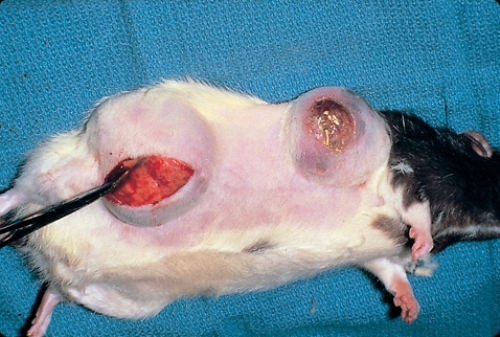Difference between revisions of "Small Mammals Q&A 03"
(Created page with "<br style="clear:both;" /> {| align="left" width="100%" style="background-color:#04B4AE" |- | align="center" | 90px|Mansonlogo | align="left" | This ques...") |
|||
| (4 intermediate revisions by 2 users not shown) | |||
| Line 3: | Line 3: | ||
|- | |- | ||
| align="center" | [[File:Manson_logo.gif|90px|Mansonlogo]] | | align="center" | [[File:Manson_logo.gif|90px|Mansonlogo]] | ||
| − | | align="left" | This question was provided by [[:Category:Manson|Manson Publishing]] as part of the [[OVAL Project]]. See more [[Category: Small Mammals Q&A|Small Mammals questions]] | + | | align="left" | This question was provided by [[:Category:Manson|Manson Publishing]] as part of the [[OVAL Project]]. See more [[:Category: Small Mammals Q&A|Small Mammals questions]] |
|} | |} | ||
<br><br><br> | <br><br><br> | ||
| Line 16: | Line 16: | ||
*Although metastasis is rare, perform radiographs before surgery. Tumours generally metastasize to regional lymph nodes, abdominal viscera or lungs. | *Although metastasis is rare, perform radiographs before surgery. Tumours generally metastasize to regional lymph nodes, abdominal viscera or lungs. | ||
*During surgical removal of mammary tumors, collect regional lymph nodes to stage the disease. Unless ulcerated or suspected to be malignant, do not remove the skin overlying the tumour. Ligate any blood vessels supplying the tumour. Closure is routine. Use a subcuticular suture pattern or skin staples because rodents frequently chew and may remove the sutures. Use an Elizabethan collar as needed. Prognosis for recovery is good unless there is metastasis. | *During surgical removal of mammary tumors, collect regional lymph nodes to stage the disease. Unless ulcerated or suspected to be malignant, do not remove the skin overlying the tumour. Ligate any blood vessels supplying the tumour. Closure is routine. Use a subcuticular suture pattern or skin staples because rodents frequently chew and may remove the sutures. Use an Elizabethan collar as needed. Prognosis for recovery is good unless there is metastasis. | ||
| − | |l1= | + | |l1= Mammary Neoplasia |
|q2= How does this condition in rats compare with that in mice and guinea pigs? | |q2= How does this condition in rats compare with that in mice and guinea pigs? | ||
|a2= In mice, mammary tumors are frequently malignant, invasive and difficult to remove. They are associated with infection by the mouse mammary tumor virus. | |a2= In mice, mammary tumors are frequently malignant, invasive and difficult to remove. They are associated with infection by the mouse mammary tumor virus. | ||
In guinea pigs, about 70% of the mammary gland tumors are benign fibroadenomas and 30% are mammary adenocarcinomas. | In guinea pigs, about 70% of the mammary gland tumors are benign fibroadenomas and 30% are mammary adenocarcinomas. | ||
| − | |l2= | + | |l2= Mammary Neoplasia |
|q3= What would you recommend to prevent the occurrence of these tumours in pet rats? | |q3= What would you recommend to prevent the occurrence of these tumours in pet rats? | ||
|a3= Ovariohysterectomy at a young age may decrease the incidence of mammary gland tumours and can be recommended to owners of female pet rats. | |a3= Ovariohysterectomy at a young age may decrease the incidence of mammary gland tumours and can be recommended to owners of female pet rats. | ||
| − | |l3= | + | |l3= Mammary Neoplasia |
</FlashCard> | </FlashCard> | ||
Latest revision as of 12:45, 16 August 2011
| This question was provided by Manson Publishing as part of the OVAL Project. See more Small Mammals questions |
A two-year-old female intact pet rat develops these two large tumors on her abdomen:
| Question | Answer | Article | |
| What is your diagnosis and prognosis? |
|
Link to Article | |
| How does this condition in rats compare with that in mice and guinea pigs? | In mice, mammary tumors are frequently malignant, invasive and difficult to remove. They are associated with infection by the mouse mammary tumor virus.
In guinea pigs, about 70% of the mammary gland tumors are benign fibroadenomas and 30% are mammary adenocarcinomas. |
Link to Article | |
| What would you recommend to prevent the occurrence of these tumours in pet rats? | Ovariohysterectomy at a young age may decrease the incidence of mammary gland tumours and can be recommended to owners of female pet rats.
|
Link to Article | |
